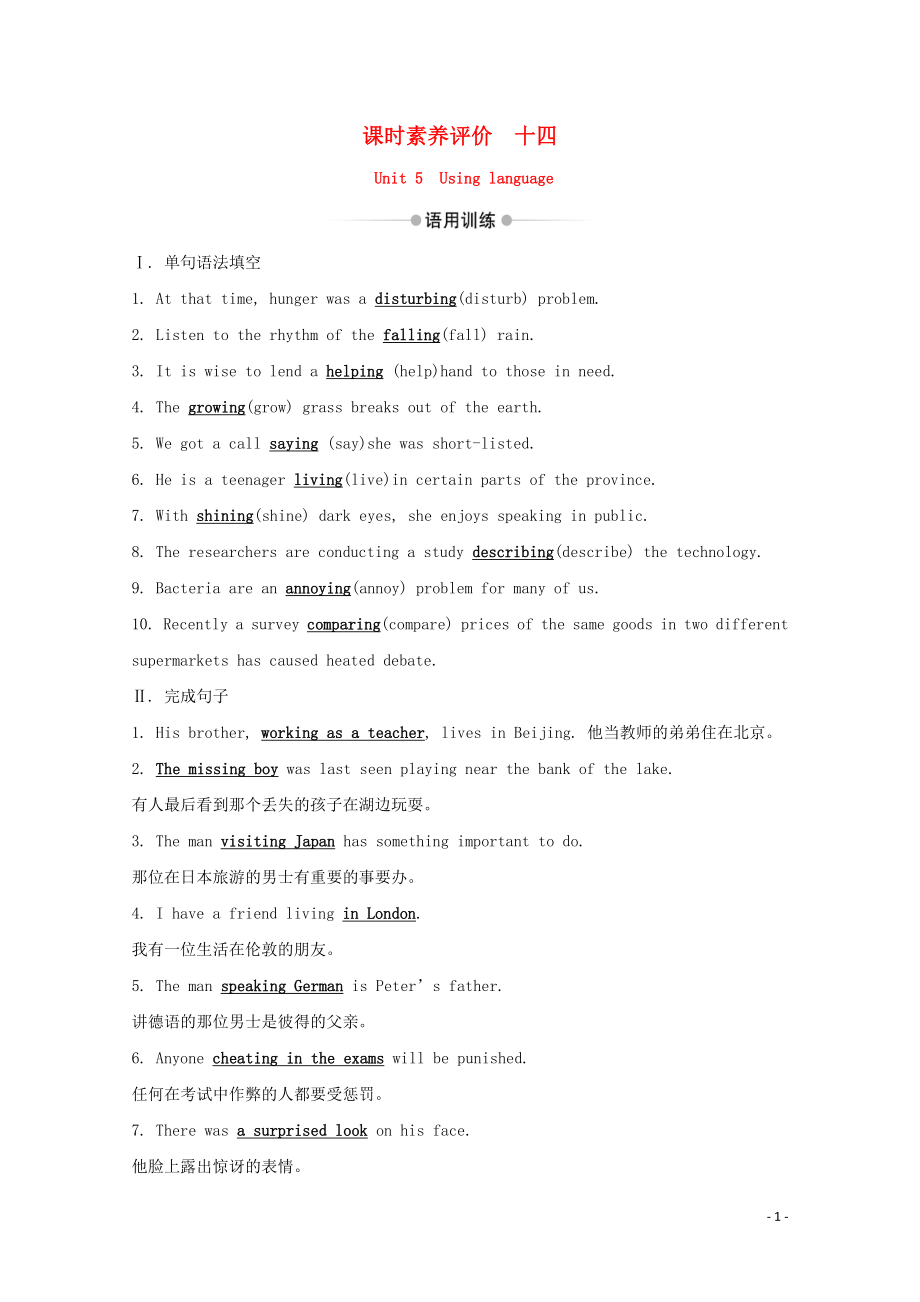《2019-2020學(xué)年新教材高中英語(yǔ) 課時(shí)素養(yǎng)評(píng)價(jià)十四 Unit 5 On the road Using language 外研版必修2》由會(huì)員分享�����,可在線閱讀����,更多相關(guān)《2019-2020學(xué)年新教材高中英語(yǔ) 課時(shí)素養(yǎng)評(píng)價(jià)十四 Unit 5 On the road Using language 外研版必修2(5頁(yè)珍藏版)》請(qǐng)?jiān)谘b配圖網(wǎng)上搜索。
1��、課時(shí)素養(yǎng)評(píng)價(jià) 十四
Unit 5 Using language
Ⅰ. 單句語(yǔ)法填空
1. At that time, hunger was a disturbing(disturb) problem.
2. Listen to the rhythm of the falling(fall) rain.
3. It is wise to lend a helping (help)hand to those in need.
4. The growing(grow) grass breaks out of the earth.
5. We got a call say
2��、ing (say)she was short-listed.
6. He is a teenager living(live)in certain parts of the province.
7. With shining(shine) dark eyes, she enjoys speaking in public.
8. The researchers are conducting a study describing(describe) the technology.
9. Bacteria are an annoying(annoy) problem for many
3��、 of us.
10. Recently a survey comparing(compare) prices of the same goods in two different supermarkets has caused heated debate.
Ⅱ. 完成句子
1. His brother, working as a teacher, lives in Beijing. 他當(dāng)教師的弟弟住在北京���。?
2. The missing boy was last seen playing near the bank of the lake.
有人最后看到那個(gè)丟失的孩子在湖邊
4��、玩耍���。
3. The man visiting Japan has something important to do.
那位在日本旅游的男士有重要的事要辦�����。
4. I have a friend living in London.
我有一位生活在倫敦的朋友��。
5. The man speaking German is Peter’s father.
講德語(yǔ)的那位男士是彼得的父親���。
6. Anyone cheating in the exams will be punished.
任何在考試中作弊的人都要受懲罰。
7. There was a surprised lo
5����、ok on his face.
他臉上露出驚訝的表情。
8. Don’t read on the moving bus, or your eyesight will get worse. 不要在行進(jìn)中的公交車上看書, 否則你的視力會(huì)越來越差�����。?
完形填空
Last summer, we went to Hawaii for holiday. During my 1 trip with my husband, we spent most of our time 2 during the day in the sea, and then enjoying walks al
6�����、ong the beach in the evenings.
We didn’t take any 3 because we had enough. We had visited the island many times 4 . On our way to the 5 we joked that other than our sunburnt skin, we had no way to show that we had 6 there! ?
As we stood in line at the check-in, we noticed the 7 who h
7�、ad been on our plane the week before. 8 , they all had tear-filled eyes this day. On the plane, we sat directly behind them: a mother and her four children without Dad’s 9 . We learned that the father had been 10 in a jet-skiing accident that week, and his wife and children had to 11 make the
8����、ir way home without him.
We watched the children become 12 while they were playing cards. But the mother stared at her knees, 13 to believe her husband’s death. We could 14 feel her pain as we realized that this could have happened to any of us. 15 we were laughing and playing in the wat
9、er, this poor family had been 16 the sufferings. The vacation they had dreamed about had 17 the terrible dream they would never forget.
I suddenly 18 that we had no pictures for this vacation together. I closed my eyes, 19 that my mind had recorded all the wonderful moments that I had 2
10、0 with my husband that week. What a trip! ?
【文章大意】本文為記敘文�����。去年夏天作者一家去夏威夷旅行, 返程中遇到了曾經(jīng)一起去度假的一家人���。那家人的父親在那個(gè)星期的水上摩托事故中喪生, 他的妻子和孩子不得不勇敢地獨(dú)自回家���。從而感嘆, 自己應(yīng)該珍惜與親人共享的美好時(shí)刻。
1. A. week-long B. month-long
C. year-long D. weekend
【解析】選A����。根據(jù)文章最后“I had with my husband that week. ”可知, 此處指“在和我丈夫?yàn)槠谝恢艿穆眯衅陂g”。?
2
11���、. A. flying B. travelling
C. swimming D. walking
【解析】選C��。根據(jù)下文“in the sea”可知, 此處指“在海里游泳(swim)”��。
3. A. action B. children C. photos D. friends
【解析】選C�����。根據(jù)下文“we had no pictures for this vacation together. ”可知, 此處指“我們沒有拍任何照片(photo)”�。
4. A. before B. ago
C. now D. yet
【解析】選A。before單獨(dú)使用時(shí), 是泛指“以
12����、前”, 常常和完成時(shí)連用; ago“以前”, 不能單獨(dú)使用, 應(yīng)與three days/weeks等連用, 而且和動(dòng)詞的過去時(shí)連用; now現(xiàn)在; yet已經(jīng)(用在否定或疑問句)。此處意為“我們以前參觀過這個(gè)島很多次了”����。
5. A. sea B. airport
C. destination D. station
【解析】選B。根據(jù)下文“As we stood in line at the check-in, we noticed. . . on our plane the week before. ”可知, 此處指“在去機(jī)場(chǎng)的路上”��。
6. A. traveled B. le
13��、ft
C. missed D. forgotten
【解析】選A�����。根據(jù)語(yǔ)境, 此處指“我們沒有辦法證明我們?cè)谀抢锫眯?travel)過”�����。
7. A. class B. parent
C. passenger D. family
【解析】選D���。根據(jù)下文“On the plane, we sat directly behind them: a mother and her four children without Dad’s ”可知, 此處指“當(dāng)我們?cè)谵k理登機(jī)手續(xù)排隊(duì)時(shí), 我們注意到一周前和我們一同乘坐過飛機(jī)的那一家人(family)”。?
8. A. Therefore
14�、B. Otherwise
C. However D. Then
【解析】選C�。根據(jù)語(yǔ)境可知, 此處指“然而(however), 那天他們眼睛里都充滿了淚水”�����。
9. A. attendance B. care
C. protection D. love
【解析】選A��。attendance出席; care關(guān)心; protection保護(hù); love愛��。根據(jù)下文“make their way home without him. ”可知, 此處指“一位母親和她的四個(gè)孩子沒有父親的出席(陪伴)”�。
10. A. hit B. discovered
C. forbidden D. k
15、illed
【解析】選D�。根據(jù)語(yǔ)境可知, 此處指“我們得知那位父親在那個(gè)星期的水上摩托事故中喪生(kill)?�!?
11. A. nervously B. bravely
C. confidently D. proudly
【解析】選B��。根據(jù)語(yǔ)境可知, 此處指“他的妻子和孩子不得不勇敢地(bravely)獨(dú)自回家”��。
12. A. unworried B. sad
C. worried D. frightened
【解析】選A�����。unworried無(wú)憂無(wú)慮的; sad悲傷的; worried擔(dān)心的; frightened害怕的��。根據(jù)下文“while they were play
16��、ing cards”可知, 此處指“我們看著孩子們打牌時(shí)變得無(wú)憂無(wú)慮”。
13. A. unable B. likely
C. willing D. afraid
【解析】選A���。根據(jù)上文“But the mother stared at her knees”可知, 此處指“無(wú)法(unable)相信她丈夫的死”�。
14. A. never B. ever
C. almost D. hardly
【解析】選C��。根據(jù)下文“as we realized that this could have happened to any of us”可知, 此處指“我們幾乎(almost)能感覺到她
17���、的痛苦”�����。
15. A. Whether B. While
C. Although D. If
【解析】選B����。Whether是否; While當(dāng)……的時(shí)候; Although雖然; If如果�����。根據(jù)語(yǔ)境可知, 此處指“當(dāng)我們?cè)谒镦倚ν嫠r(shí)(while)”�����。
16. A. feeling B. experiencing
C. fighting D. ignoring
【解析】選B。feeling感到; experiencing經(jīng)歷; fighting戰(zhàn)斗; ignoring忽視����。根據(jù)語(yǔ)境可知, 此處指“這個(gè)可憐的家庭一直經(jīng)歷(experience)著苦難”����。
17. A
18、. wiped out B. eased off
C. broken up D. turned into
【解析】選D�����。wiped out消滅; eased off緩解; broken up分解; turned into變成了��。根據(jù)語(yǔ)境可知, 此處指“他們夢(mèng)想的假期變成(turn into)了他們永遠(yuǎn)不會(huì)忘記的噩夢(mèng)”���。
18. A. regretted B. decided
C. remembered D. discovered
【解析】選A���。根據(jù)語(yǔ)境可知, 此處指“我突然后悔(regret)我們沒有這個(gè)假期在一起的照片”。
19. A. noticing B. hoping
C. finding D. seeing
【解析】選B���。noticing注意到; hoping希望; finding發(fā)現(xiàn); seeing看到��。根據(jù)語(yǔ)境可知, 此處指“我閉上眼睛, 希望(hope)我的頭腦已經(jīng)記錄下了所有美好的時(shí)刻”�。
20. A. created B. valued
C. shared D. planned
【解析】選C����。created創(chuàng)造; valued珍惜; shared分享; planned計(jì)劃���。根據(jù)語(yǔ)境可知, 此處指“和我丈夫一起分享(share)的美好時(shí)刻”。
- 5 -
 2019-2020學(xué)年新教材高中英語(yǔ) 課時(shí)素養(yǎng)評(píng)價(jià)十四 Unit 5 On the road Using language 外研版必修2
2019-2020學(xué)年新教材高中英語(yǔ) 課時(shí)素養(yǎng)評(píng)價(jià)十四 Unit 5 On the road Using language 外研版必修2

